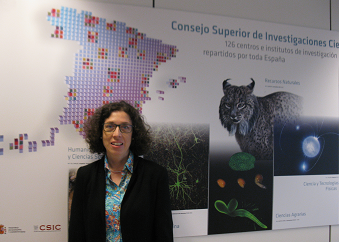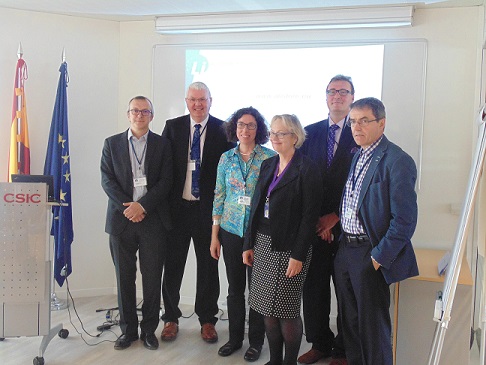
Interview with M. Rosa Palacín Peiro (ICMAB – CSIC)
Rosa Palacin Peiro is a researcher at the Institute of Materials Science of Barcelona (ICMAB-CSIC) and, since 18 months, she is also the deputy director. Graduated in Chemistry, she carried out her doctoral thesis in solid-state chemistry and her research career is focused on the study of materials for batteries, with both fundamental and more applicable research projects. Furthermore, she is the Coordinator of ALISTORE-ERI, European Research Institute.
What is the reason for and duration of your visit
We are holding a meeting of Alistore-ERI, European Research Institute (www.alistore.eu), created to perpetuate a Network of Excellence of the 6th Framework Programme. We usually hold two meetings per year, organised each time by a different member of the network. In this occasion, since we are inviting MEP Julie Girling (member of the Committee of Environment, Public Health and Food Safety of the European Parliament) to the meeting, we decided it would be appropriate to hold this event in Brussels, and the existence of this Office gave us an excellent opportunity for that. We will be here for three days, until Wednesday the 15th.
Is this a casual visit or do you come to Brussels often?
Although I´ve travelled to Brussels several times, this is the first time I visit the CSIC Office. This meeting is, as I mentioned, a bit exceptional, but it is clearly possible that if we have another chance we will apply for the use of these rooms to hold other meetings.
The functioning of the European Research Institute and the advantages of participating in this type of structures:
This is a network with no legal personality of its own, but it has a Scientific Board and an Executive Assembly. The academic and industrial members pay an annual fee of 5,000 € and 25,000 €, respectively. This money is mainly used to fund PhD or postdoc students. With respect to management, the network functions as a research unit of the CNRS.
The advantages of being part of this network are numerous: European networking (not only at the academic level, but also at the industrial level), the possibility of being involved in collaborations and to apply for other projects, visibility, greater dissemination and impact of the research results obtained in the specific field of application, etc.
What kind of relationship do you have with the industrial members of the network?
This network has academic and industrial members and the relationship with the companies is very good. The industrial representatives that come to our meetings are truly interested in basic science and once a year they are given a presentation on the topic they are most interested in. For example, in this specific meeting we gave them a presentation on the state-of-the-art of lithium-air and lithium-sulphur batteries.
Lessons learned during these years as a coordinator:
The experience was very rewarding, both at the personal and professional levels. We learned to manage the diversity of national regulations, protocols, personalities, experiences, etc., and one can always learn a lot from that.
On the other hand, Alistore-ERI has already become a big family that gathers twice a year. We have created close bonds of collaboration that have allowed us to expand our research spectrum and go far beyond. It has been a very positive experience despite the casual difficulties, although overcoming these has given us even further experience.
Other European projects in which you participate or coordinate:
Currently, only one project of the Horizon 2020 programme, which began in January 2015: Naiades (www.naiades.eu), coordinated by the Commissariat à l’énergie atomique et aux énergies alternatives (CEA). We also have an application for Fet-Proactive pending evaluation, coordinated by another Spanish partner.
How did you find the experience?
Excellent, and worth repeating.

